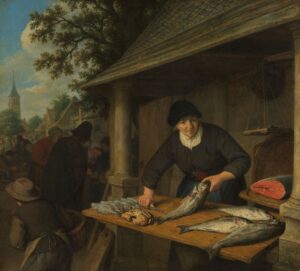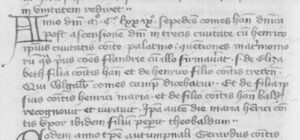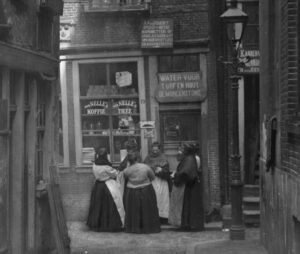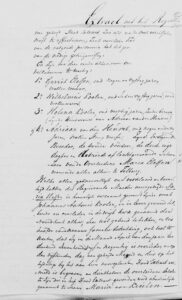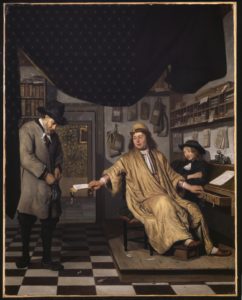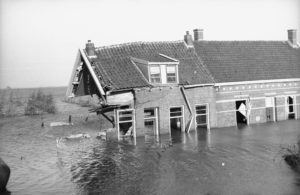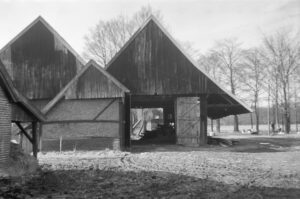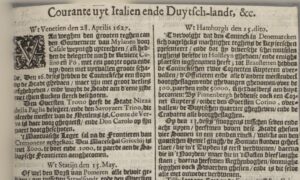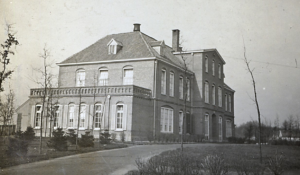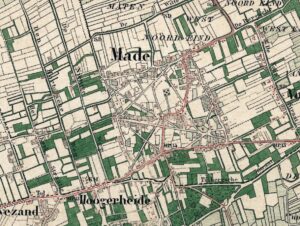A visvrouw [literally: fish woman] is a female fish seller. It was not uncommon for wives of fishermen to sell the fish at markets. … [Read more...]
Quick tip – Old does not mean original
When you are working with old manuscripts, it is tempting to think they are original records—the first recorded version of the document. However, even old manuscripts may be derivative records—copies, transcriptions, or abstract of older versions. Sometimes, the original record does not survive and the derivative is all we have to work with. But we have to keep in mind that it may have copy or interpretation errors. In the past, when people created a copy, they may not necessarily have tried … [Read more...]
Dutch term – Water-en-vuur-winkel
A water-en-vuur-winkel (literally: water and fire shop) was a shop where you could buy buckets of hot water and hot coals to get your own fire started. Water-en-vuur-winkels were mainly found in larger cities. … [Read more...]
Case study: incorrectly recorded burial of Maria Elissen
My ancestor Maria Elissen was the wife of Johannes Antonij Koolen. I knew she must have died between 1789, when her youngest child was born, and 24 December 1798, when her husband was called a widower when he died.1 The burial register for Tilburg for this period is indexed and appears to be complete. However, no burial was found for Maria Elissen.2 The only burial for a Maria, wife of Jan Koolen was Maria van Keulen, who was buried on 15 April 1795, the wife of Jan Koolen.3 Could this have … [Read more...]
Dutch term – Vruchtgebruik
Vruchtgebruik (literally: use of the fruits) is the Dutch term for usufruct, the right to use a property, usually for the remainder of one's life. You may encounter the term in notarial records, for example in wills that give someone the vruchtgebruik of a property that is then left to someone else after they die, or in a sale record where the vruchtgebruiker (person who has the right of vruchtgebruik) relinquishes their rights. You may also find the term in death duties files, which would … [Read more...]
Quick tip – List of Historical Disasters in the Netherlands
Philip van Diemen de Jel and Irene Walstra have a list on their website with Historical Disasters in the Netherlands (in Dutch and English). This list is useful if you see an unexpected cluster of deaths in your family. Since Dutch death records do not list a cause of death, it can be hard to find out how an ancestor died. Knowing there was a epidemic, bombing, or flood in the area can help you find out what may have happened. See also other tips for how to find a cause of death. … [Read more...]
Dutch term – Schuur
A schuur is a barn or a shed. Some of my ancestors lived at the Roerdink farm in the Netherlands from the 1400s to the 1600s. The farm still exists. The main building has been renewed but some of the outbuildings have not. They used tree ring dating on the barn a couple of years ago and it was from 1544 so it was built when my ancestors lived there. It is the oldest known barn in the Netherlands. Cultural Heritage Service (CC-BY-SA). … [Read more...]
Dutch Genealogy News for May 2022
This is an overview of the new sources, websites, and projects that were announced last month. Sources Death Duties files for Zeeland 1818-1927 have been added to the Zeeuws Archief website. The records of the village of Schijndel 1312-1811 have been digitized and are available via the Brabants Historisch Informatie Centrum website. Many building permits in the east of Noord-Brabant have been scanned and are now available via the Brabants Historisch Informatie Centrum website. Where … [Read more...]
Quick tip – Was your relative in an asylum?
Here are a couple of ways you may find out that your relative was in an asylum: Asylum records. Some of these are digitized or indexed. You may stumble upon these records by searching. Death records, where the informant was an employee of the asylum, or the place of death is an asylum. Research the address if someone died away from home. Marriage supplements of children, if the person was unable to consent to their children's marriage because of their mental state. Court records, … [Read more...]
Extreme Ancestors – Johanna van Groezen, wife, mother of two, widow in the same year
In this post in my Extreme Ancestors series, I want to introduce you to Johanna van Groezen, who became a wife, mother of two children, and a widow; all in the space of eight months. Johanna van Groezen and her first husband Adriaan Marijnissen are my third great-grandparents. Johanna van Groezen was twenty-one years old when she married Adriaan Marijnissen. They married in Made en Drimmelen in North Brabant on 6 February 1864. They both worked as laborers. He was 27 years old, she was … [Read more...]
